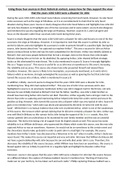Essay
"Using these four sources in their historical context, assess how far they support the view that the years were a disaster for John" Model essay
- Module
- Unit 1 (Y103)
- Institution
- OCR
A model, A grade, 30 mark essay analysing historical sources to assess whether the years were a success or failure for King John
[Show more]



